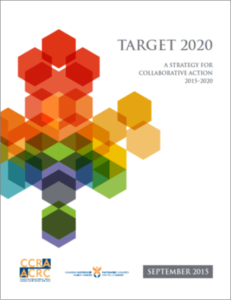Given the success of the CCRA’s initial Pan-Canadian Cancer Research Strategy, members agreed to develop the next shared strategy. As a result, the current strategy aims to accelerate research and maximize the impact of research investments to benefit Canadians living with and affected by cancer.
Current Strategy: Target 2020
Target 2020 Strategy is the second strategy developed by CCRA members. It outlines actions to address research priorities over the coming five years through coordinated and collaborative research efforts and investments.
Target 2020 supplements the activities of individual CCRA member organizations through new shared initiatives aimed at strengthening Canada’s cancer research enterprise by addressing gaps.
Six Thematic Goals
Six thematic goals emerged, and the strategy details supporting objectives, strategies, and tactics for each.
Discovery
To enhance and optimize the value of discovery research through collaborative opportunities.
Key Outcome:
- Launch new joint-funding initiatives involving discovery-based research; promote eligibility of discovery research within existing funding opportunities sponsored by CCRA member organizations.
Clinical Innovation
To improve and expedite the translational pipeline and advance personalized medicine research and its application through collaboration.
Key Outcomes:
- Expand the funding base of the Canadian Cancer Clinical Trials Network (3CTN) and implement a sustainability plan with stakeholders and funding partners.
- Implement a business plan for a pan-Canadian network of genomic and molecular diagnostic labs.
- Keep critical activities of the Canadian Tissue Repository Network (CTRNet) available to the cancer research community.
Prevention
To implement recommendations of the Cancer Prevention Research in Canada Framework and to promote collaborative opportunities for using population platforms to move prevention research forward.
Key Outcomes:
- Launch funding opportunities to promote prevention research and its translation, as well as to promote collaboration and build capacity.
- Implement funding mechanisms to support research undertakings using data and samples from the CanPath (formerly known as the Canadian Partnership for Tomorrow Project (CPTP)), and promote awareness, access, and use of the CanPath platform.
Patient Experience
To identify the research gaps and collaborative opportunities in cancer survivorship and end-of-life research.
Key Outcome:
- Develop and launch strategic survivorship, and palliative and end-of-life research frameworks.
Health Services
To support health system efficiency and effectiveness by improving health-services research capacity, knowledge integration, and innovation.
Key Outcome:
- A health services research plan expanding on existing infrastructure is implemented.
Core Activities
To demonstrate accountability by reporting on research investments made by member organizations, and to demonstrate the link between research investment, system readiness, and patient outcomes.
Key Outcomes:
- Report investments in cancer research as well as its impact.
- The CCRA continues to host the biennial Canadian Cancer Research Conference (CCRC).

